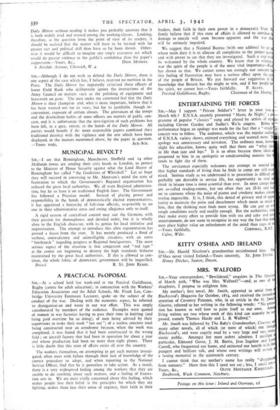ENTERTAINING THE FORCES
Sue,—May I support "Private Soldier's" letter in your issue March 6th ? E.N.S.A. recently presented "Music At Night," a gramme of popular "classics" sung and played by artists of rep including Covent Garden and Sadler's Wels singers. Before performance began an apology was made for the fact that a "straight concert was to follow. The audience, which was the regular audit of E.N.S.A. variety shows, enjoyed everything and wanted more. apology was unnecessary and mistaken. The ordinary man, hewn slight his education, knows quite well that there are "other ide, in life than jazz and legs." It is so often because these ideals presented to him in an apologetic or condescending manner that tends to fight shy of them.
The serviceman especially welcomes any attempt to remind 11 that higher standards of living than he finds in camp are still rei. nised. Serious study as we understand it in peacetime is difficult probably not desirable in service life, but opportunity to read think in leisure time is more essential than ever. In most camps the are so-called reading-rooms, but too often they are ill-lit and he on to canteens where the noise of pianos and crockery makes conc trat ion impossible. It is, I think, this denial of privacy and of oppa tunity to maintain the poise and detachment which mean so much I him, that the thinking man finds most trying. He can put up w: rough conditions easily and readily enough. But the authorities, V. they make every effort to provide him with tea and cake and nce entertainment, do not seem to recognise in any way the fact that man men place higher value on refreshment of the mind than cups of


























 Previous page
Previous page